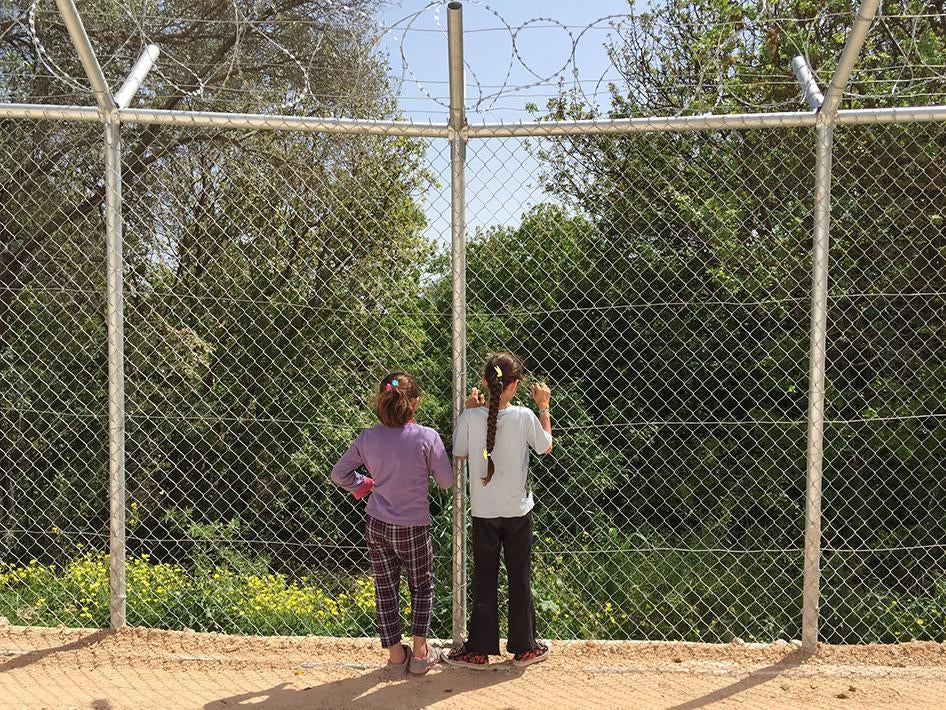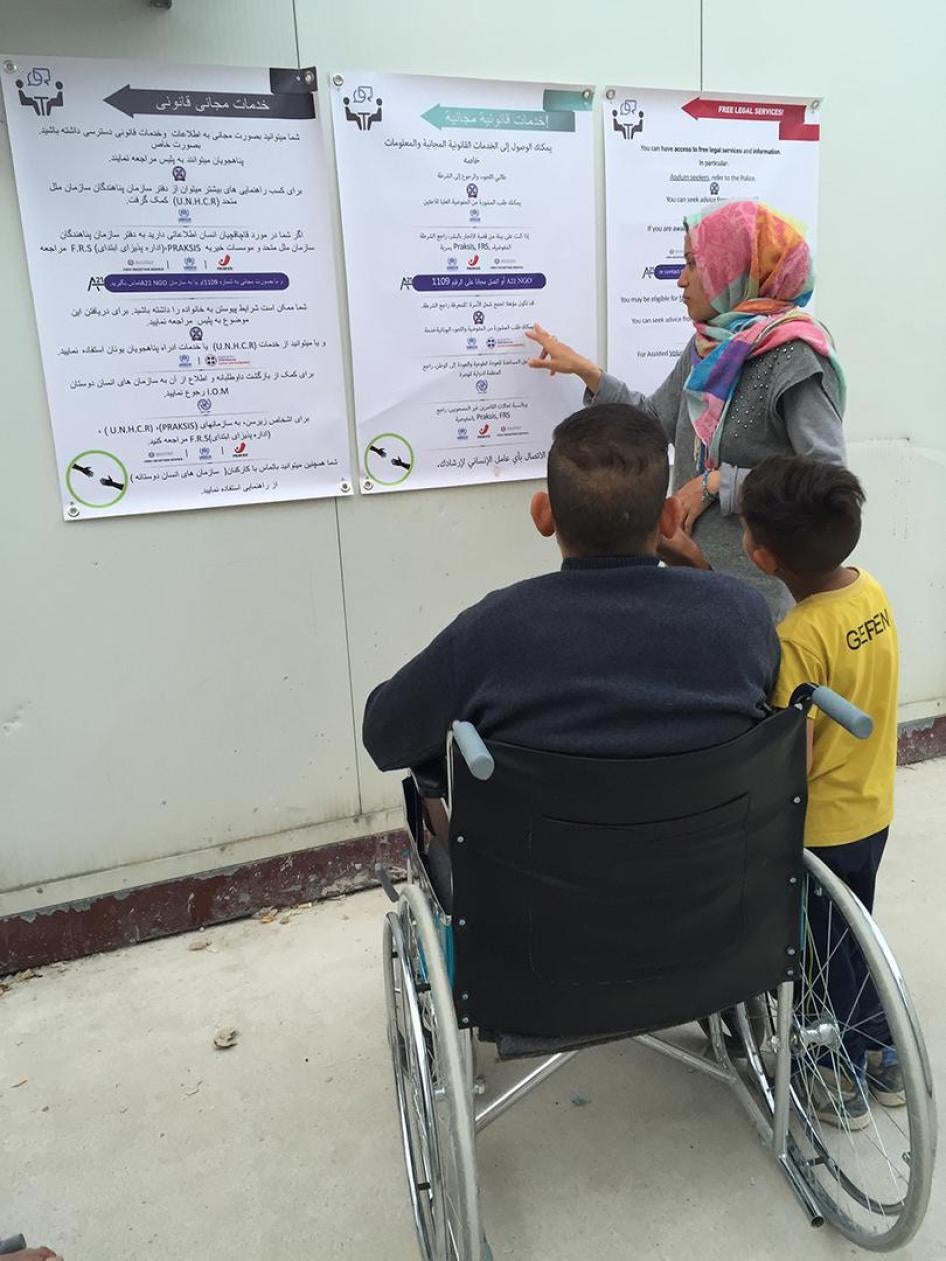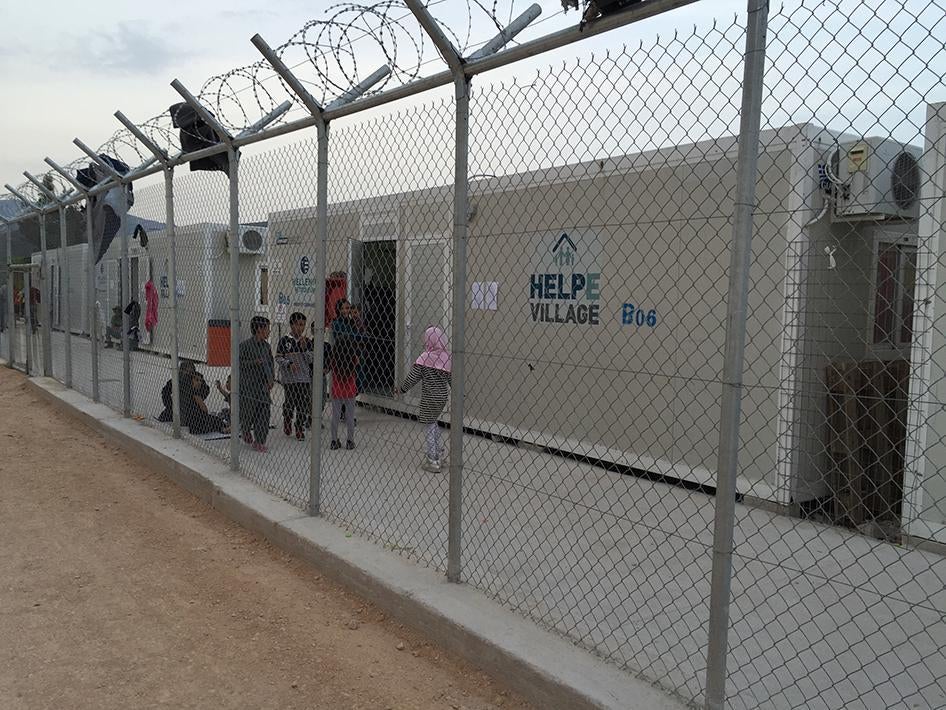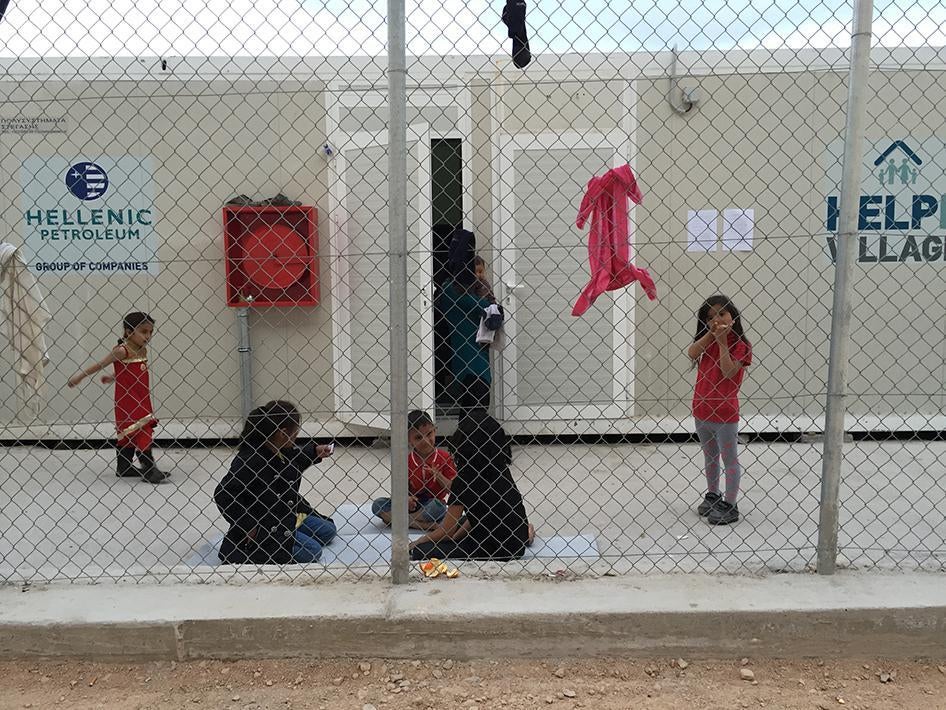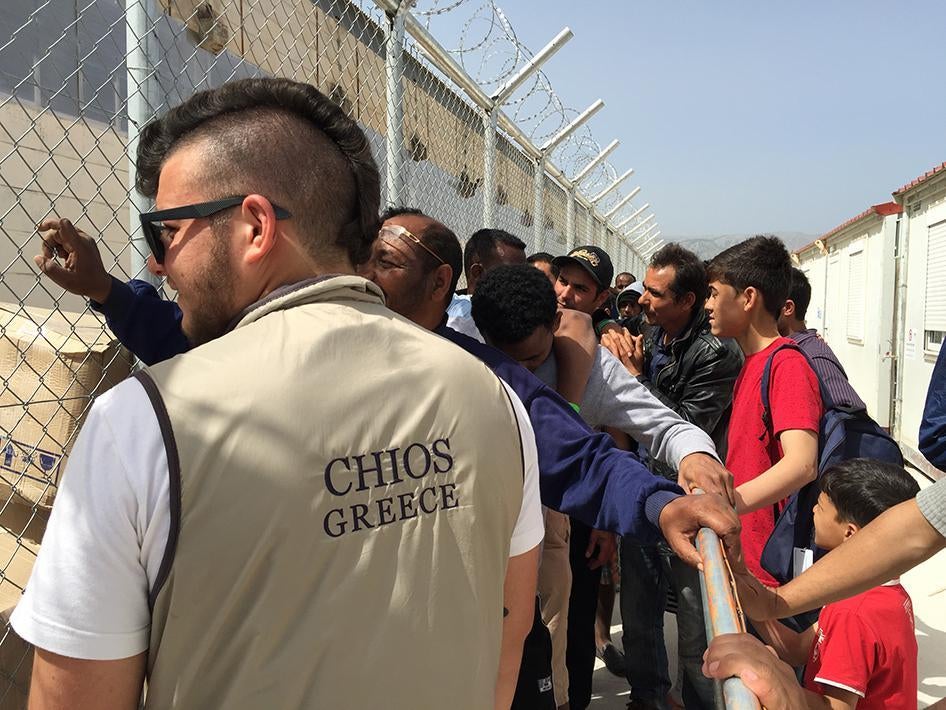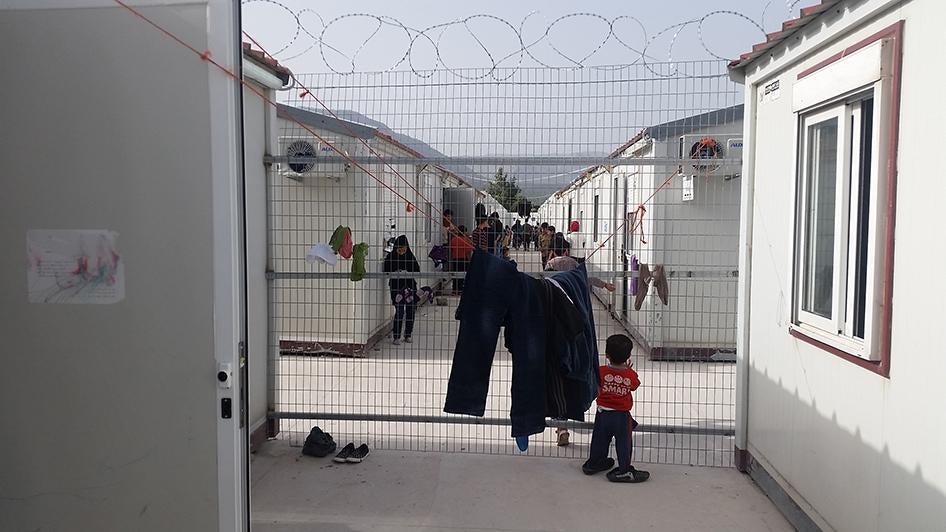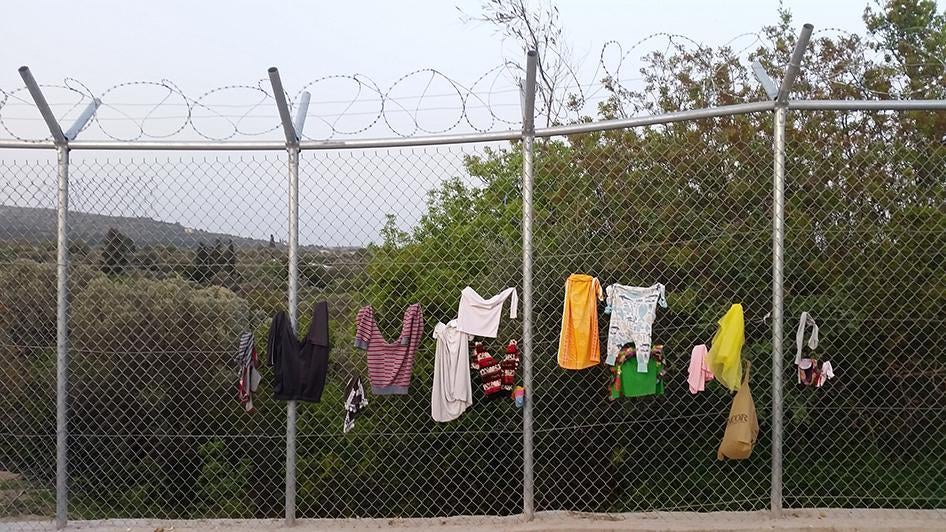(Athens) – Greek authorities, in coordination with the European Union, are automatically detaining all asylum seekers and migrants who arrive on the islands of Lesbos and Chios in deplorable conditions, Human Rights Watch said today. The detention of about 4,000 people creates particular hardships for vulnerable people who are held, such as children, pregnant women, and people with disabilities.
The blanket detention of all asylum seekers and migrants in closed facilities is unjustified, given the possibility of less restrictive options, and amounts to arbitrary detention. The two closed facilities should be converted into open camps with appropriate services and safety for people needing protection from war, persecution, and human rights abuses.
“The EU’s policy, carried out in Greece, has locked up families and others who have fled horrors such as ISIS terror, Taliban threats, or Syrian-government barrel bombs,” said Eva Cossé, Greece specialist at Human Rights Watch. “When alternatives to detention exist, as they do on the Greek islands, there is no legal or moral justification to hold asylum seekers and migrants behind bars.”
In visits to Lesbos and Chios from April 3 to 9, 2016, Human Rights Watch found that the police-guarded camps on both islands were holding a wide array of people with special needs, including women with young children, pregnant women, unaccompanied children, elderly men and women, and people with physical and psychosocial disabilities. None of the detainees had proper access to health care, sanitation facilities, or legal aid.
Both camps began operating as open reception and registration centers for the hundreds of thousands of people who had reached the islands since early 2015 but they were converted suddenly to prison-like camps on March 20, 2016, when a deeply flawed deal between the EU and Turkey came into effect. Asylum seekers and migrants who have arrived since then are detained by Greek authorities, with help from the EU’s border agency, Frontex, and forbidden to leave the camps.
The Moria facility on Lesbos, with about 3,100 people, is surrounded by fence topped with barbed-wire. At the VIAL facility – a former aluminum factory – on Chios, the roughly 1,000 detainees are only allowed to move in a limited area with housing containers, surrounded by a fence with barbed wire.
As open facilities, Moria and VIAL had been serviced by a variety of humanitarian organizations and the United Nations High Commissioner for Refugees, but most of these, including UNHCR, suspended their operations after March 20, consistent with their policies not to provide services in closed facilities.
Conditions at Moria and VIAL deteriorated rapidly due to the fear, frustration, over-crowding, and lack of services. Tensions at VIAL culminated on April 1 when violent clashes erupted between Syrian and Afghan detainees. About 400 people broke free from the facility and are now at one of two open camps in the town of Chios.
Greece’s new detention policy resulted from the agreement between the EU and Turkey reached in mid-March. On April 2, the Greek parliament hastily adopted a law that allows blanket “restriction of movement” on new arrivals inside closed facilities at border entry points – such as the islands – for up to 25 days during reception and identification. It provides for asylum seekers to be detained for up to three months while their claims are processed.
People subject to deportation, including back to Turkey, can be detained for up to 18 months. The law decreased the maximum time that asylum seekers can be held in detention in Greece, but provides for a fast-track procedure to examine international protection claims within 15 days, including appeal. The fast-track procedure has not begun yet, but once in place, it would undermine the effective exercise of asylum seekers’ rights, Human Rights Watch said.
Many, if not most, of those currently detained in VIAL have expressed a desire to seek asylum in Greece, but the system is overwhelmed and the promised EU support is lagging, Human Rights Watch said. Similarly, as of April 12, all except 15 people detained in Moria had submitted an asylum application, according to the Greek police.
A key aim of the EU-Turkey deal is to reject almost all asylum applications on the grounds that Turkey is a safe country for refugees and asylum seekers, and to enable swift deportations back there. Turkey cannot be considered a safe country due to its refusal to grant effective protection to non-Europeans in need, including Afghans and Iraqis, Human Rights Watch has repeatedly said. Turkey has also repeatedly pushed Syrians back into the war zone and closed borders to others trying to flee.
The EU-Turkey deal is fundamentally flawed and should be repealed, Human Rights Watch said. All asylum claims submitted by people in Greece should be examined on their individual merits, and other EU countries should support Greece and asylum seekers there by immediately fulfilling their commitments to relocate tens of thousands of asylum seekers from Greece. EU and Greek authorities, in cooperation with UN agencies, should provide alternative accommodation for all asylum seekers, and limit the detention of asylum seekers to exceptional circumstances.
“The current situation in Greece for desperate asylum seekers is perverse,” said Cossé. “People fleeing danger are detained in unacceptable conditions while they await a likely return to unsafe Turkey or languish in the dysfunctional Greek asylum system.”
For details of conditions in the locked facilities, rights of asylum seekers, and the new asylum review procedures, please see below.
Inadequate Services, Safeguards
During unrestricted visits to the VIAL closed center on Chios on April 7 and 8, Human Rights Watch interviewed 21 people, including 15 with specific health or other needs. Mobility in the camp was restricted, with people locked into one of two sections that had housing containers, basic showers and toilets, and very little open space.
The authorities had made no provisions to separate children from unrelated adults or to address protection concerns for women. The facility was holding at least three unaccompanied children, all of them in the same area as adults.
Detainees said they had limited running water, a lack of hot water, and poor hygienic conditions. “It is so difficult here,” said a 25-year-old single mother from Afghanistan with a 5-year-old son. “You are inside a prison. The food is not edible, and every day, half of the day, there is no running water. Conditions are not clean and who knows what kind of diseases are here. We didn’t commit any crime to be in this prison.”
Women’s showers and toilets are separated from men’s but they lacked locks for privacy, and some women said they worried about their safety. “When someone is going inside to take a shower, someone [else] needs to stay outside to hold the curtain and make sure no one comes inside,” a 24-year-old woman from Afghanistan said. “I never go alone.”
VIAL has no showers that are accessible for people in wheelchairs and only one accessible toilet for people with physical disabilities in each section of the camp.
Detainees criticized the nutritional quality of the food, especially for children. “They don’t give milk every day,” a 32-year-old mother from Afghanistan said. “I have five children and two of them are already sick. It is very difficult to take care of them in a situation like this.”
As of April 9, only rudimentary health care was provided in VIAL by the Hellenic Red Cross and the army. Medical staff, including female staff, were only available during limited hours, with no services at night, though a few people with serious conditions have been transferred to the local hospital. A social worker in VIAL told Human Rights Watch that more doctors are expected in the coming days.
One elderly couple from Khanaqin in Iraq said they did not have access to the medical treatment they needed. “My husband has a heart ailment and Alzheimer’s,” the woman said. “All of his tablets fell into the sea.”
Human Rights Watch met a 45-year-old woman from Afghanistan, a former professor who fled the Taliban, huddling in the corner of her container. Her nephew said she has severe mental health issues and showed a document from the Spanish Red Cross saying she suffers from severe depression and adjustment disorder, which is typically triggered by an intensely stressful event. As recommended treatment, a doctor had suggested a variety of anti-depressants and anti-psychotics, but the nephew said he had not been able to obtain any medications or other mental health care.
Similar conditions apparently exist at Moria camp on Lesbos, a facility holding approximately 3,100 people – about 1,000 over capacity. The Greek government did not grant Human Rights Watch access to the facility.
One detainee interviewed through the fence said he was lucky to sleep in a tent. “This is because I came two weeks ago,” he said. “Whoever comes now sleeps outside, and the toilets are really dirty. You go inside and you can’t even take a breath. The food is disgusting and the water is dirty. Both me and my friend have skin problems from washing in this water and drinking it.”
Another detainee at the fence, a 17-year-old boy traveling alone from Syria, showed Human Rights Watch a skin rash that he said had developed because of the water.
Amnesty International, which visited Moria on April 5, reported that the packed facility was holding people with disabilities, pregnant women, and a large number of children, including a baby with health complications from an attack in Syria. Only three doctors were regularly available to provide medical care, Amnesty International said.
Greek police have said that over the last week authorities in Moria have transferred about 700 vulnerable people to open camps on the island. To reduce overcrowding at VIAL, on April 7, the authorities transferred 243 people to a closed facility on Leros, another Greek island in the southern Aegean. At the same time, an average of 170 people per day continue to arrive on Greek islands, and all are automatically detained.
Arbitrary Detention, Scant Review of Claims
Under Greek and international law, all detainees, including irregular migrants and asylum seekers, must be informed, in a language they understand, of the reasons for their detention and their rights, including the right to challenge their detention and the right to legal aid. Despite this, none of the people interviewed by Human Rights Watch had been given a detention order or were informed about the reason for their detention.
Detainees on Chios did not know they could challenge their detention, and they had no effective access to lawyers. As of April 9, too few interpreters were available at the camp for the many languages spoken by people there, including Arabic, Kurdish, and Farsi. Only one of the interpreters, for Arabic, is a woman.
“I ask every day why I am detained but there is no answer to my question,” said a 24-year-old woman from Afghanistan who applied for asylum in Greece while held in VIAL.
On Chios, only one case officer from the Greek asylum service is reviewing asylum claims; as of April 8, he had processed 9 of 1,206 cases of people who had expressed the desire to apply for asylum in Greece. Three more officers are scheduled to arrive at the end of May. The lack of interpreters requires the use of interpretation services over the phone from Athens.
Five officers from the European Asylum Support Office (EASO) are supposed to arrive on Chios on April 18. Their role, under the EU-Turkey deal, is to conduct preliminary reviews to determine whether asylum applications are inadmissible because the person had or could have applied for protection in Turkey.
